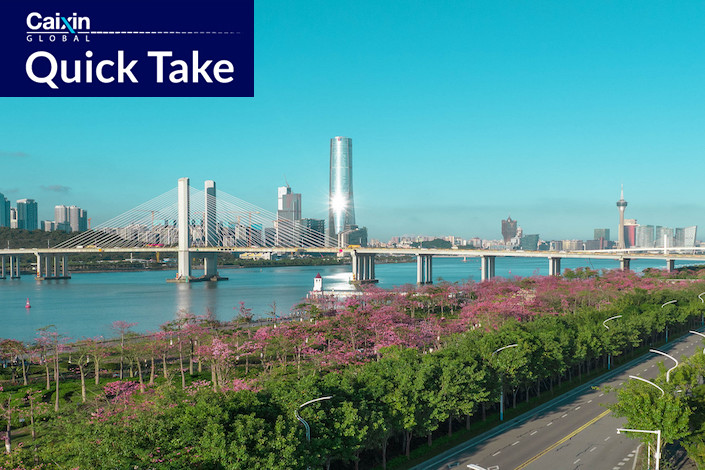
What’s new: Southern China’s Guangdong provincial government outlined the division of functions and responsibilities for development of the Hengqin Guangdong-Macao Deep Cooperation Zone in a guideline document issued Wednesday.
Hengqin is a small island to the west of Macao and a district of Zhuhai city in Guangdong. The Hengqin Guangdong-Macao Deep Cooperation Zone, rolled out in 2019, aims to create a synergistic relationship between Macao and Hengqin by facilitating business, trade and the movement of people across borders.
The document clarifies the roles of management and implementation agencies in the zone, Zhu Wei, deputy director of the Guangdong Development and Reform Commission, said Wednesday at a news conference.
The guidelines address the problem of responsibility allocation, but cooperation between Guangdong and Macao mainly relies on discussion and hasn’t formed a clear development management model, a person familiar with Guangdong-Macao cooperation told Caixin.
The regulation proposes to optimize the business environment for Macao companies to invest in the zone. A new neighborhood project under construction is expected to be completed in 2023 and will provide about 4,000 housing units for Macao residents in the zone, Zhu said at the news conference.
The background: The development of Hengqin is part of the Guangdong-Hong Kong-Macao Greater Bay Area plan, an ambitious project unveiled in 2017 to transform the Pearl River Delta into a world-class city cluster to rival famous bay areas centered on Tokyo, New York and San Francisco.
The State Council approved a plan September 2021 to expand the Hengqin Guangdong-Macao Deep Cooperation Zone eightfold, making it twice the size of New York City’s Manhattan district.
In 2022, the zone generated 46.2 billion yuan ($6.8 billion) of gross domestic product, down 0.5% from 2021. The government attributed the decline to demand contraction and supply shock. The area accounts for about 12% of the GDP of the city of Zhuhai.
The zone also acts as a means for diversifying Macao’s economy to reduce its dependence on casinos. Gambling houses accounted for approximately half of Macao’s GDP in 2019, before the pandemic. Casinos normally account for more than 80% of government revenue.
Contact reporter Denise Jia (huijuanjia@caixin.com) and editor Bob Simison (bob.simison@caixin.com)
Get our weekly free Must-Read newsletter.







